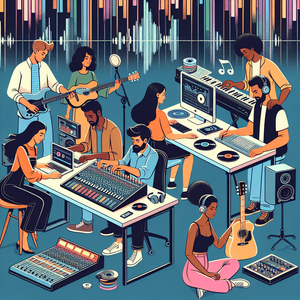
Exploring Exciting Career Opportunities for Music Performance Graduates: From Stage to Studio and Beyond
Embarking on a journey in Music Performance opens doors to a myriad of career paths that extend far beyond traditional roles like stage performer or music educator. Today’s music landscape is diverse and ever-evolving, offering graduates opportunities in fields such as music therapy, arts administration, and music production, among others. As the industry adapts to advancements in technology and shifting cultural trends, those with a degree in Music Performance can leverage their talents in innovative ways that align with their passions. This article not only explores the various career options available but also delves into current job market dynamics, salary expectations, and the sought-after skills by employers, empowering aspiring musicians to navigate their futures effectively.
Job Summaries:
Professional Musician:
- Musicians thrive on stage, performing solo or alongside bands across different genres.
- Success in this competitive field requires a firm understanding of music theory, exceptional performance skills, and the ability to collaborate effectively.
- In an age dominated by social media, self-promotion has become vital for gaining visibility and securing gigs.
Music Educator:
- Teachers in this realm cultivate the next generation of musicians by imparting knowledge on music theory, history, and performance techniques.
- Whether in schools or private studios, music educators design lesson plans that inspire and prepare students for performances.
- A degree in music education or performance, coupled with strong communication skills, is essential in this rewarding role.
Music Producer:
- Producers play a pivotal role in the music industry, overseeing the recording and production of tracks.
- They collaborate closely with artists and sound engineers, making familiarity with music software and sound engineering crucial.
- A successful producer not only shapes the sound of recordings but also has a lasting impact on artists' careers.
Music Therapist:
- Merging the healing power of music with therapeutic practices.
- Music therapists assist individuals in overcoming emotional, mental, or physical challenges.
- This career requires specialized training, including a degree in music therapy and certification.
- Demonstrating a commitment to using music as a tool for healing.
Music Agent:
- Music agents act as advocates for artists.
- They promote artists' work.
- They secure performance opportunities.
- They negotiate contracts.
- A deep understanding of the music industry is vital.
- Excellent communication skills are essential.
- A background in music business or performance is a strong asset.
Broadcast Technician:
- These professionals ensure top-notch sound quality for radio, television, and live performances.
- A background in sound engineering or music production is advantageous in maintaining the technical equipment necessary for a seamless audio experience.
Sound Engineer:
- Tasked with creating and manipulating sound for recordings and live performances
- Sound engineers require expertise in audio technology
- A degree in audio engineering or production typically prepares them for this role.
Choral Conductor:
- Conductors lead choral groups
- Using their musicality and leadership skills to guide rehearsals and performances
- This role typically necessitates a degree in music performance or choral conducting.
Music Critic:
- Music critics analyze performances and industry trends.
- They share their insights through written articles or blogs.
- Strong writing skills are crucial for success in this role.
- A solid understanding of music theory is crucial for success in this role.
Music Director:
- Overseeing the musical elements of productions
- Music directors collaborate with various artists to create cohesive performances
- This position often requires a degree in music performance
- Strong leadership capabilities
Arts Administrator:
- These professionals manage the business aspects of arts organizations
- Including budgeting
- Marketing
- Event planning
- Playing a key role in the sustainability of music institutions.
Music Supervisor:
- Music supervisors select and license tracks for media.
- They enhance narratives through music.
- A comprehensive understanding of music rights is essential in this role.
- Current trends in music are important for music supervisors.
Composer:
- Composers craft original music across various platforms, from film to video games.
- This creative position typically requires a degree in music composition or performance, along with a strong technical foundation.
Event Coordinator for Music Festivals:
- Coordinators plan and execute large-scale music events.
- Exceptional organizational skills are necessary.
- A passion for music is essential.
- A background in event management can enhance effectiveness in this role.
Private Music Instructor:
- Instructors provide personalized education to students through one-on-one lessons.
- A degree in music performance or education is generally required to guide students effectively.
Music Licensing Specialist:
- Specialists in this field manage the legal aspects of music rights
- Necessitating a solid understanding of copyright law
- Negotiation skills
Folk Music Performer:
- By specializing in traditional music styles
- Folk performers connect with audiences through acoustic instruments
- Cultural storytelling is a key aspect
- Bringing heritage alive through their art
Sound Designer:
- Sound designers create immersive audio experiences for performances and multimedia projects.
- They enhance audience engagement through carefully crafted soundscapes.
Music Archivist:
- These professionals collect and preserve music-related materials
- requiring keen attention to detail
- and a profound knowledge of music history.
Music Influencer:
- Utilizing the power of social media
- Music influencers promote artists and trends
- Engaging with music lovers
- Shaping public perceptions in a digital age
The path for music performance graduates is rich with diverse and fulfilling career options, each presenting unique challenges and rewards. By embracing adaptability and pursuing interdisciplinary skills, graduates can flourish in roles that resonate with their passions while making significant contributions to the cultural landscape. As you contemplate your future in music, remember that the possibilities are as varied and vibrant as the art form itself.
Explore More Jobs

